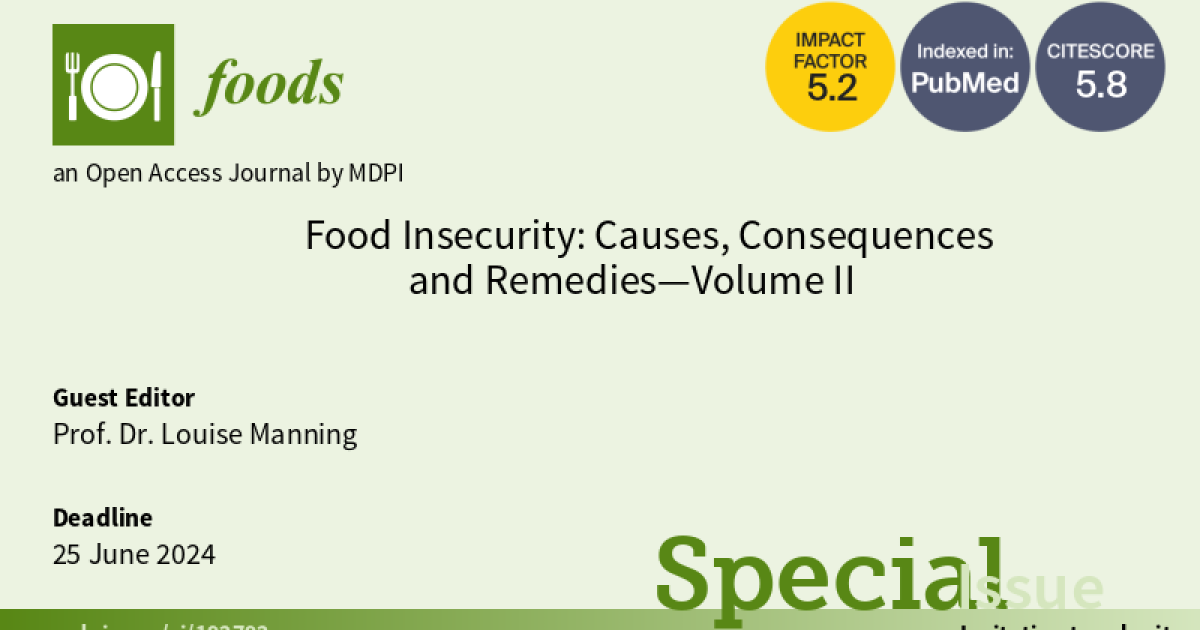Food Insecurity: Causes, Consequences and Remedies—Volume II
A special issue of Foods (ISSN 2304-8158). This special issue belongs to the section "Food Security and Sustainability".
Deadline for manuscript submissions: 25 December 2024 | Viewed by 16360

Special Issue Editor
Interests: food sefaty; food security; food fraud; food crime; foodscape; food integrity; food defence
Special Issues, Collections and Topics in MDPI journals
Special Issue Information
Dear Colleagues,
Food insecurity affects all communities worldwide, as many find it difficult to consistently access nutritious, affordable food. This problem is exacerbated by conflict, political insecurity, climate change, and global shocks, such as the COVID-19 pandemic.
This Special Issue seeks to develop a collection of innovative, contemporary research that considers the causes, consequences, and remedies for food insecurity at an individual, household, community, regional, or even global scale. Multiple socioeconomic factors influence food insecurity, particularly nutrition insecurity; these will be explored within the research papers, alongside the contemporary politico-environmental factors that also play a part.
This Special Issue welcomes contributions from researchers across the world who are considering how to address food insecurity and what mechanisms are of the greatest benefit in reaching the Sustainable Development Goals, especially SDG1: no poverty; SDG 2: zero hunger; SDG 3: good health and wellbeing; and SDG 10: reducing inequalities.
Prof. Dr. Louise Manning
Guest Editor
Manuscript Submission Information
Manuscripts should be submitted online at www.mdpi.com by registering and logging in to this website. Once you are registered, click here to go to the submission form. Manuscripts can be submitted until the deadline. All submissions that pass pre-check are peer-reviewed. Accepted papers will be published continuously in the journal (as soon as accepted) and will be listed together on the special issue website. Research articles, review articles as well as short communications are invited. For planned papers, a title and short abstract (about 100 words) can be sent to the Editorial Office for announcement on this website.
Submitted manuscripts should not have been published previously, nor be under consideration for publication elsewhere (except conference proceedings papers). All manuscripts are thoroughly refereed through a single-blind peer-review process. A guide for authors and other relevant information for submission of manuscripts is available on the Instructions for Authors page. Foods is an international peer-reviewed open access semimonthly journal published by MDPI.
Please visit the Instructions for Authors page before submitting a manuscript. The Article Processing Charge (APC) for publication in this open access journal is 2900 CHF (Swiss Francs). Submitted papers should be well formatted and use good English. Authors may use MDPI's English editing service prior to publication or during author revisions.
Keywords
- food security
- food insecurity
- poverty
- SDGs
- causes
- consequences
- production
- self-sufficiency
- global
- trade
Benefits of Publishing in a Special Issue
- Ease of navigation: Grouping papers by topic helps scholars navigate broad scope journals more efficiently.
- Greater discoverability: Special Issues support the reach and impact of scientific research. Articles in Special Issues are more discoverable and cited more frequently.
- Expansion of research network: Special Issues facilitate connections among authors, fostering scientific collaborations.
- External promotion: Articles in Special Issues are often promoted through the journal's social media, increasing their visibility.
- e-Book format: Special Issues with more than 10 articles can be published as dedicated e-books, ensuring wide and rapid dissemination.
Further information on MDPI's Special Issue polices can be found here.






